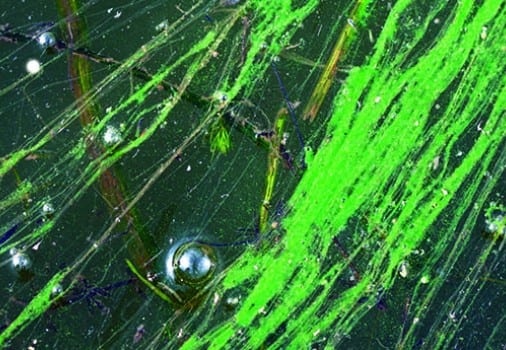Do you value local journalism? Support NottinghamMD.com today.
NOTTINGHAM, MD – An algae bloom that is harmful to humans and fatal to pets has been found in Maryland.
Officials in Montgomery County are asking residents to use caution when recreating on or near Lake Needwood and Lake Frank located within Rock Creek Regional Park. Testing there has indicated high levels of microcystin, a toxic substance produced by some species of blue-green algae (cyanobacteria), in Lake Needwood.
Microcystin, a hepatotoxin, can cause harm to the liver of humans and pets if ingested. Of particular concern are dogs that are off-leash and may swim and/or drink from the lake, despite park regulations.
The toxic algae has already killed pets in North Carolina. There have also been recent sightings in Pennsylvania, according to Lancaster Online.
Harmful algal blooms (HABs) are the rapid growth of algae that can cause harm to animals, people, or the local ecology. A HAB can look like foam, scum, or mats on the surface of water and can be different colors, according to the CDC. HABs can produce toxins that have caused a variety of illnesses in people and animals. HABs can occur in warm fresh, marine, or brackish waters with abundant nutrients and are becoming more frequent with climate change.
So, what can Maryland residents do?
- Do not swim in areas where a bloom of blue-green algae is evident;
- Do not drink/cook with suspected water. In-home treatments like boiling, chlorine bleach or water filtration units offer little protection from HAB toxins;
- If contact is unavoidable, wash off with clean water;
- If you feel unwell or skin irritation persists, see a physician or healthcare provider;
- Keep pets and livestock away from bloom areas; and
- Contact your veterinarian for sick pets.


